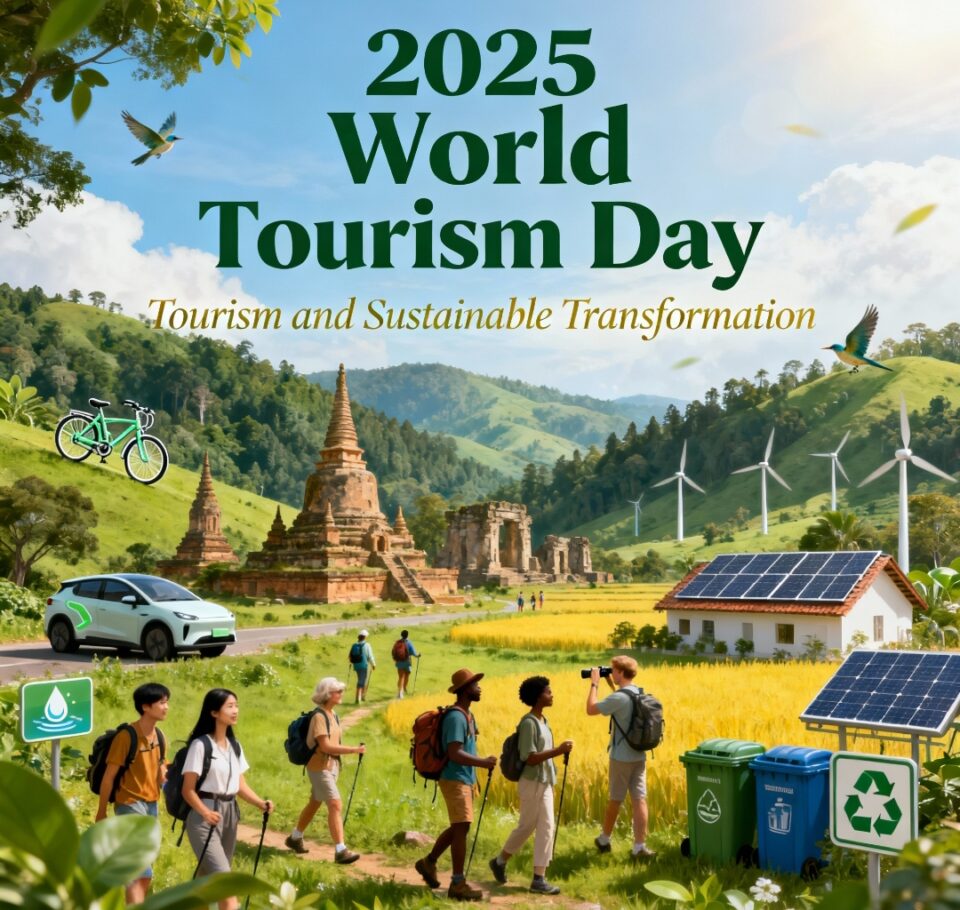By Prisca Sam-Duru
Countries across the globe commemorated World Tourism Day, last Saturday September 27, being the day set aside each year to highlight tourism’s role in economies and communities worldwide.
This year’s theme, “Tourism and Sustainable Transformation,” focused on how the industry can drive positive changes while protecting the environments and cultures of the different peoples of the world.
The United Nations established every September 27, in 1980, to mark the adoption of its tourism organization’s statutes. The day encourages people to think about travel’s impact, from job creation to cultural exchanges.
This year, the commemoration shifted from a day beyond the beaches and planes to focusing on sustainable transformation of the industry across the globe. It became more than a moment to reflect on travel’s significant role of strengthening economies and promoting cultural exchange.
In other words, tourism provides communities across the planet with their livelihoods. With the theme “Tourism and Sustainable Transformation,” this year’s commemoration challenges the global travel industry to become a powerful force for good—protecting the environments and cultures that draw visitors in the first place.
Following years of global challenges and a growing climate crisis, the goal in 2025 centered on how to forge an industry that is more resilient, inclusive, and fundamentally sustainable.
Media reports show that major global events were hosted in Melaka, Malaysia, where world leaders gathered to chart a path forward. The discussions centered on actionable, sustainable practices—reducing the carbon footprint of travel, ensuring equitable benefits for local communities, and balancing industry growth with ecological protection. It recognised that the old model of mass, low-cost tourism is no longer viable in a ‘climate-stressed world’.
According to a report, the global tourism industry, projected to contribute $11.7 trillion to the world economy in 2025 and support an estimated 371 million jobs, is a major economic engine. Yet, it also contributes an estimated 8% of global greenhouse gas emissions, primarily through aviation and cruise travel. Furthermore, the very destinations that tourists flock to—coastal areas, mountain resorts, and world heritage sites—are highly vulnerable to the impacts of climate change, from rising seas to unreliable snow seasons.
Nowhere is the sustainable shift more evident than in Costa Rica, a nation said to have built its reputation on eco-friendly travel.
The day aligned with the 70th anniversary of the Instituto Costarricense de Turismo (ICT), giving the country a platform to showcase its approach, rooted in the “Pura Vida” philosophy of simple, pure life, the report stated.
Costa Rica welcomes over two million visitors annually. Its strategy is a masterclass in balancing growth with conservation. The ICT rigorously promotes responsible tourism, led by certification programs for businesses that prioritize sustainability. This includes robust efforts to protect the country’s national parks, pristine beaches, and rich wildlife areas. From talks in San José highlighting how tourism supports rural communities to coastal activities that connect visitors with traditions like coffee tours and sea turtle conservation, the focus is on creating a reciprocal relationship between traveler and destination.
However, even this model faces challenges. Climate change places stress on the country’s crucial assets.
From mass tourism to climate education
The global movement toward sustainability is prompting a fundamental redesign of the traveler experience. The World Bank is advocating for “resilient, higher-value tourism,” which suggests a future of fewer visitors spending more, rather than the high-volume, low-cost models that lead to overcrowding and strain local resources.
In Europe, the effects of ‘overtourism’, the report noted, are already sparking a backlash. Cities like Venice have introduced day-tripper charges and restricted cruise ships, while Amsterdam has limited the expansion of new hotels. These actions reflect a global awareness that mass tourism often damages fragile environments, inflates local living costs, and compromises the quality of life for residents.
The shift, however, isn’t just about restrictions; it’s about education. Experts argue that tourism can become a vital teaching tool for climate change. Rather than avoiding the issue, destinations can turn it into an opportunity. This approach suggests a profound change in the traveler mindset.
On the 2025 World Tourism Day, the challenge wasn’t to stop traveling, but to travel thoughtfully (or responsibly). Choosing eco-certified hotels, supporting local artisans, and learning about the environmental pressures on a destination are simple but crucial actions.
Here in Nigeria, the celebration was held across states such as Plateau, Abia, Ekiti, Lagos, Ogun, Anambra, Bauchi etc. Some of the state governments made pledges to revive their existing tourism sites while many others promised to harness the rich tourism potentials of their states. Lagos state government for instance, pledged to transform the artificial sheltered beach known as Tarkwa Bay, into a world-class tourist site.
Tourists Club International, TCI, which has environmental stewardship as one of its objectives based on the fact that without the environment (the grundnorm) there would be little or no tourism, arts and culture, used the 2025 World Tourism Day to announce the appointments of its Grand Patron and patron expected to steer TCI towards achieving its lofty objectives.
In all, there was a unanimous agreement that tourism is more than travel; it’s also an entrance to sustainable transformation, cultural pride and economic growth.
Looking ahead, the industry is focused on technological and communal transformation. From apps that promote low-impact travel to partnerships with indigenous groups to ensure cultural preservation, the progress is evident.


